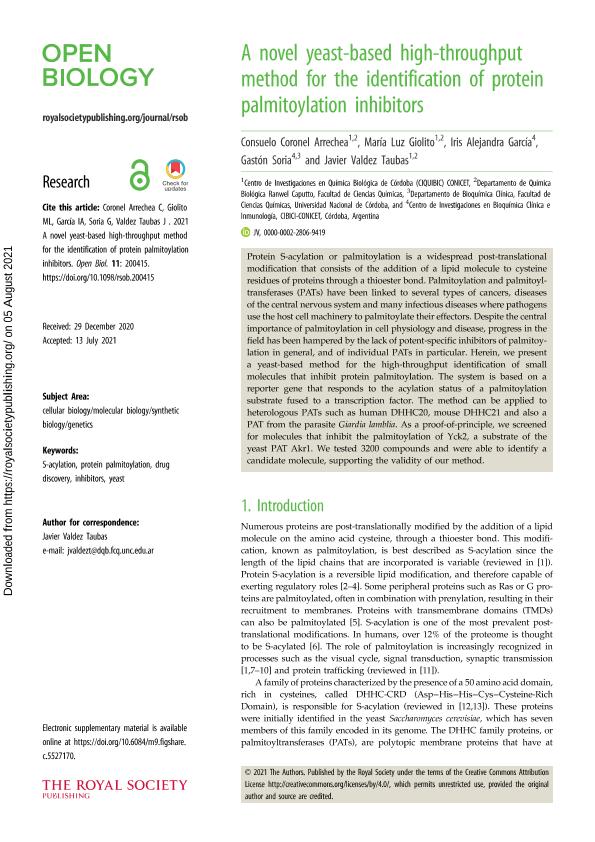Artículo
A novel yeast-based high-throughput method for the identification of protein palmitoylation inhibitors
Coronel, Consuelo ; Giolito, Maria Luz
; Giolito, Maria Luz ; García, Iris Alejandra
; García, Iris Alejandra ; Soria, Gastón; Valdez, Javier Esteban
; Soria, Gastón; Valdez, Javier Esteban
 ; Giolito, Maria Luz
; Giolito, Maria Luz ; García, Iris Alejandra
; García, Iris Alejandra ; Soria, Gastón; Valdez, Javier Esteban
; Soria, Gastón; Valdez, Javier Esteban
Fecha de publicación:
08/2021
Editorial:
Royal Society Publishing
Revista:
Open Biology
e-ISSN:
2046-2441
Idioma:
Inglés
Tipo de recurso:
Artículo publicado
Clasificación temática:
Resumen
Protein S-acylation or palmitoylation is a widespread post-translational modification that consists of the addition of a lipid molecule to cysteine residues of proteins through a thioester bond. Palmitoylation and palmitoyltransferases (PATs) have been linked to several types of cancers, diseases of the central nervous system and many infectious diseases where pathogens use the host cell machinery to palmitoylate their effectors. Despite the central importance of palmitoylation in cell physiology and disease, progress in the field has been hampered by the lack of potent-specific inhibitors of palmitoylation in general, and of individual PATs in particular. Herein, we present a yeast-based method for the high-throughput identification of small molecules that inhibit protein palmitoylation. The system is based on a reporter gene that responds to the acylation status of a palmitoylation substrate fused to a transcription factor. The method can be applied to heterologous PATs such as human DHHC20, mouse DHHC21 and also a PAT from the parasite Giardia lamblia. As a proof-of-principle, we screened for molecules that inhibit the palmitoylation of Yck2, a substrate of the yeast PAT Akr1. We tested 3200 compounds and were able to identify a candidate molecule, supporting the validity of our method.
Palabras clave:
DRUG DISCOVERY
,
INHIBITORS
,
PROTEIN PALMITOYLATION
,
S-ACYLATION
,
YEAST
Archivos asociados
Licencia
Identificadores
Colecciones
Articulos(CIQUIBIC)
Articulos de CENTRO DE INVEST.EN QCA.BIOL.DE CORDOBA (P)
Articulos de CENTRO DE INVEST.EN QCA.BIOL.DE CORDOBA (P)
Citación
Coronel, Consuelo; Giolito, Maria Luz; García, Iris Alejandra; Soria, Gastón; Valdez, Javier Esteban; A novel yeast-based high-throughput method for the identification of protein palmitoylation inhibitors; Royal Society Publishing; Open Biology; 11; 8; 8-2021; 1-11
Compartir
Altmétricas



